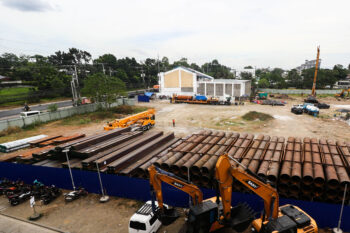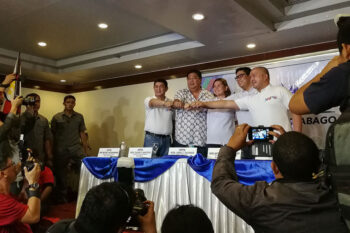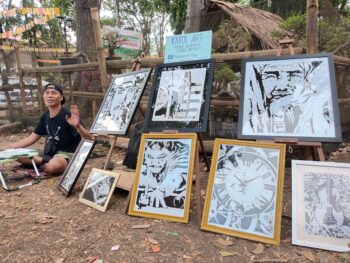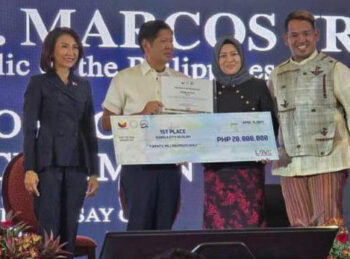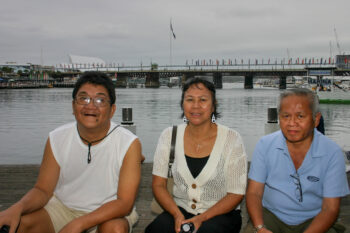(The following is a modified transcript of the 20-minute presentation of a working paper “The Marawi Crisis: A Derridean Reading” at the Forum “Terror in Marawi: Looking through Different Perspectives,” organized by the Social Sciences and Education Cluster at Ateneo de Davao University, June 30, 2017.)
My esteemed co-panelists – Sir Dennis [Coronel, MA] and Ma’am Diana [Taganas, CPA, MA] – Ma’am Carmen [Sabino, RP, RPm] and her team of young and energetic organizers, my fellow students, and other members of the academe who are present in this forum: Good afternoon and salamun ‘alaykum (may peace be upon you)!
At the outset, I would like to express my gratitude to the organizers for giving me this rare opportunity to share my thoughts and views on the current crisis in Marawi.
Let me begin by narrating my favorite introductory anecdote in this regard. In a peace-building symposium-workshop last year, there was a casual conversation between (1) a Muslim NGO worker and (2) a Mindanao-based non-Muslim journalist. This conversation suddenly turned into a heated argumentation over the ‘correct’ description for such groups as the Abu Sayyaf and others. The Muslim NGO worker argued that they are ‘un-Islamic’ because “what they are doing are against the teachings of Islam!” The non-Muslim journalist countered by saying that they are ‘Islamic’ because “They use Islamic symbols, metaphors and justifications in their acts of violence!”
That heated argumentation, actually, calls to mind postmodernism’s recurring themes, one of which is Jacques Derrida’s ‘grammatology’ or semiotic analysis given in his writings. According to this prominent postmodernist, textual is the way in which the social world is constructed, and interpreting the world reflects “the textual interplay at work,” or the concepts and structures of language.
According to Derrida, there are two ways of exposing textual interplays, viz. (1) deconstruction and (2) double reading (Derrida, Of Grammatology, 1976). By ‘deconstruction, he refers to a means of showing how all theories and discourses rely on artificial stabilities produced by the use of seemingly objective and natural oppositions in language – for example, light/darkness, knowledge/ignorance, white/black, friend/enemy.
In a bid to demonstrate how these stabilizations operate, Derrida subjects the text to double reading: (1) a repetition of the dominant reading to show how it achieves its outward coherence and (2) the demonstration of the internal tensions within a text that result from the use of ostensibly natural stabilizations. In doing so, Derrida’s aim is not to come to a ‘correct’ or even ‘one’ reading of a text, but to show how there is always more than one reading of any text.
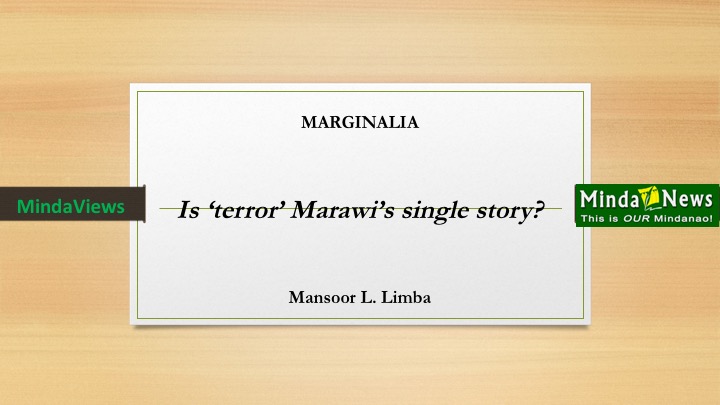
Statement of the problem
Taking postmodernist Derrida’s ‘grammatology’ or semiotic analysis as the theoretical framework, this brief presentation, which hopefully will become a working paper, shall explore the textual interplay at work in this forum’s framing of words (i.e. ‘extremism,’ ‘religious extremism,’ and ‘terror’) about the Marawi Crisis. Using Derrida’s ‘deconstruction’ and ‘double reading’ tools, in this brief presentation I shall scrutinize these three terms, viz. (1) extremism, (2) religious extremism, and (3) terror in Marawi.
Case 1: ‘Extremism’
It is mentioned in the invitation letter that there shall be a forum on “Terror in Marawi: Looking through Different Perspectives.” It is also stated thus, “…the SSE Cluster is inviting you to be one of its key speakers to discuss religious extremism” (emphasis added). One implication that can be inferred here is that the ‘terror’ in Marawi is a product of ‘religious extremism’.
In Countering/Preventing Violent Extremism (CVE/PVE) trainings and workshops, the first session is usually allotted to conceptual clarification, and the first question being posed always is something like this: Is to be ‘radical’ or ‘extremist’ necessarily bad and, therefore, condemnable?
Basically, we define ‘radical’ to be the one that advocates fundamental and/or drastic change. When we say ‘extremist’ we usually refer to someone that holds a view or displays a behavior or action different from the ‘usual’. Consciously or unconsciously, whenever we say ‘extremist’ we are imaging in our mind a spectrum having two ends which are the ‘extreme’ parts while its middle is what we imagine to be the norm or ‘normal’ as adopted by the majority.
George Washington was definitely a radical during the American War of Independence, because instead of maintaining America under the British Empire, he was opting for American independence! Andres Bonifacio was a certified extremist, because instead of just reform under Spanish sovereignty, he was fighting for separation from Spain! Nelson Mandela was a convicted terrorist for the Apartheid regime in South Africa, and because of this heinous crime, he was imprisoned for almost three decades!
By the way, how about the young Jewish man who had the audacity to turn upside down the money changers’ table in the Temple of Solomon? (Matthew 21:12-13; Mark 11:15-18; Luke 19:45-47; John 2:13-16) He would also address his fellow Jews as “You serpents, generation of vipers!” and “a wicked and adulterous generation!” He must be an extremist during his time!
As you see, knowing the context of such terms as ‘radical’ and ‘extremist’ is very important.
Case 2: ‘Religious extremism’
Let us equally pose this fundamental question: Is ‘religious extremism’ necessarily bad, and thus, blameworthy?
How about the case of one who voluntarily makes the ‘vow of celibacy and poverty’ to become a nun or priest? Accordingly, he or she makes this decision as a religious ‘calling’. How about the case of a teetotaler who totally abstains from alcohol, on account of religious conviction? How about the case of a non-smoker in a country or city of smokers, who refrains from smoking due to a religious reason?
Is their ‘religious extremism’ necessarily bad?
It’s not, of course, because there is a missing element here, namely, violent imposition or compulsion. If a would-be nun voluntarily makes a vow of celibacy and poverty, it’s just okay. It will not be okay if she begins to impose celibacy upon all women by force. If a person does not drink alcohol, it’s just okay. He will become questionable when he starts forcing the hook, line and sinker of his teetotalism down the throat of the people around him. If the would-be nun and the teetotaler do so, they may be accused of violent extremism in the name of, or under the guise of, religion.
Case 3: ‘Terror’ in Marawi
Let us now consider the third and last case – ‘terror’ in Marawi.
The title of this forum is “Terror in Marawi: Looking through Different Perspectives.” As I read this title for the first time, my take – correctly or not – was that it is like saying, “Let’s talk about toothpaste from different perspectives, but let’s just talk about Colgate!” That is to say, “Let’s come to talk about Marawi Crisis from diverse views and opinions, but let’s just talk about its ‘terror’ dimension!”
The fact is that the Marawi Crisis is a multi-dimensional issue, and ‘terror’ is just one of the many dimensions of the Crisis.
Aside from its ‘terror’ dimension, how about (1) the historical context, in particular the Philippine government’s failure to fully implement the peace agreements it has signed for decades? How about (2) the Philippine military intelligence’s success or failure? (As can be recalled, during the first day of the Marawi siege, Defense Secretary Delfin Lorenzana told us that there was no failure of military intelligence because there were already such reports of the siege, but what was lacking was ‘appreciation’ of those reports. Perhaps the Secretary fails to realize that the public knows that intelligence report without proper appreciation of it is no ‘intelligence’ at all. It’s just a wanton stockpiling of tons and tons of raw materials and information data!)
How about (3) the role of local government units’ (LGU) peace and order councils in preventing the siege, in particular that of the BPATs (Barangay Peace Action Teams) in all barangays of the occupied business district of the city? How about (4) the issue of alleged unholy marriage between local narco-politics and terrorism?
How about (5) the actual terror on the ‘war on terror’? (I am referring to the reports of military’s mishandling in checkpoints and lootings of properties in areas of the city they control.) How about (6) the issue of Philippine military modernization (specifically the challenge of modern urban warfare, and more serious than that, the challenge of asymmetrical warfare in the information age)? How about (7) the question of excessive use of force in the form of aerial bombardments against enemy targets? (What prevents the onset of snipers versus snipers scenario?)
How about (8) the problems related to the evacuees and internally displaced people (IDPs)? How about (9) the issue of rehabilitation, resettlement and internal migration?
And how about (10) the melodramatic accounts of survivors, sometimes risking their own lives for the sake of others with a different religious affiliation?
Undeniably, these are all Marawi stories, as well.
Summary
By scrutinizing the three terms (extremism, religious extremism, and ‘terror’ in Marawi), we can say that textual is indeed the way the social world is constructed. It is the same reason why we call part of the South China Sea as “West Philippine Sea” and the Benham Rise as the “Philippines Rise.”
As a ‘middle ground’, instead of ‘religious extremism’ an alternative term is ‘violent extremism (in the name of, or under the guise of, religion). And an alternative title that can be considered for this forum is: “The Marawi Crisis: Looking through Different Perspectives.”
Conclusion
In conclusion, the universe is not a monopoly of binary equations. The world – the Marawi Crisis included – is not always a case of “Either you are with us, or you are with the terrorists.” Zero-sum is not always the game in town. In the Derridean jargon, there is always a multiple reading of a text.
To take ‘terror’ as Marawi’s single story is no doubt a dangerous game to play.
[MindaViews is the opinion section of MindaNews. Mansoor L. Limba, PhD in International Relations, is a writer, educator, blogger, chess trainer, and translator (from Persian into English and Filipino) with tens of written and translation works to his credit on such subjects as international politics, history, political philosophy, intra-faith and interfaith relations, cultural heritage, Islamic finance, jurisprudence (fiqh), theology (‘ilm al-kalam), Qur’anic sciences and exegesis (tafsir), hadith, ethics, and mysticism. He can be reached at mlimba@diplomats.com, or http://www.mlimba.com and http://www.muslimandmoney.com.]

